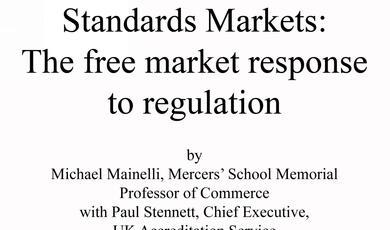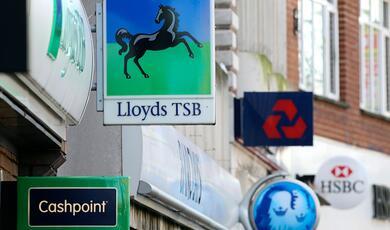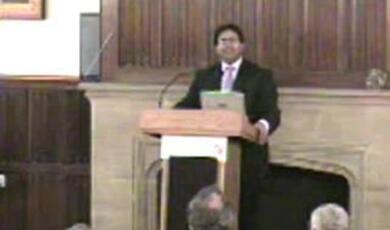What the Dickens? The City's Great Financial Scandals, Past and Future
Share
- Details
- Text
- Audio
- Downloads
- Extra Reading
The litany of great financial scandals is long, and sadly unending. Dickens himself covers scandals we would recognise today in Little Dorrit and Nicholas Nickleby. Beyond Dickens, the South Sea Bubble (of course), railway shares, bonds in newly independent countries (Kingdom of Poyais), never again... IOS, Saavundra, Rolls Razor, Bank of Gibraltar, BCCI, never again... endowment mortgages, Barlow Clowes, Equitable Life, Maxwell, Lloyd's names, Lehman Brothers, payment protection insurance, never again... This symposium seeks, through the ghosts of scandals past, present and future, to see what lessons we can learn and to assess which is rosier, the future of finance or of financial scandals.
Download Text
10 January 2013 What the Dickens? The City’s Great Financial Scandals, Past and Future Professor Michael Mainelli Through the ghosts of scandals past, present and future, what lessons can we learn and can we assess which is rosier, the future of finance or of financial scandals? I first proposed such a symposium for the City before 2000. My thinking then was that people in the City often fail to see that, at least the way the news portrays things, folks outside in the country, beyond the Circle Line, might conclude, that the City was a place where some scheme to relieve the naïve bumpkin of his or her money was unmasked about every six months. In the late 1990s I was assured that under our benign regulation all of my historical examples were irrelevant. Then alongside the biggest bubble up till that time, the Dot.Com bubble, during which I wrote a slightly prescient piece, “How I Learned To Start Worrying And Love The Dot.Bomb” came the supposedly impossible onslaught of Waste Management, Enron, Global Crossing, Worldcom, Sunbeam, Dynegy, Nicor, Halliburton and Arthur Andersen went down. But Arthur Andersen looked a sacrificial lamb as the authorities shored up the remaining four audit firms who managed on their own to produce Adelphia, Freddie Mac, Duke Energy, Kmart, Homestore.com, HealthSouth, ImClone, Nortel and AIG round one. And that was all before 2003. And it wouldn’t happen in Europe except for Parmalat and many others. Scandals are certainly not new. From this dictionary definition of “scandal” you can see that the Greeks had their “skandalon’s” 'snares, stumbling blocks'. In the programme listing we point to a long litany of great and unending financial scandals, and we skipped Egyptian, Greco-Roman, Chinese and medieval scandals - the South Sea Bubble (of course), railway shares, bonds in newly independent countries (Kingdom of Poyais), never again … IOS, Saavundra, Rolls Razor, Bank of Gibraltar, BCCI, never again … endowment mortgages, Barlow Clowes, Equitable Life, Maxwell, Lloyd’s names, precipice bonds, Lehman Brothers, payment protection insurance, never again… And since we put this symposium in the programme, LIBOR and mis-sold interest rate swaps. The global financial crises since 2007 seem to regurgitate numerous scandals. Just our domestic UK financial market manages to thrust a new scandal into the limelight every six months. I anticipate much discussion today about whether a scandal is only a scandal when laws are broken, i.e. yesterday’s scandal is out-lawed or out-regulated and becomes tomorrow’s criminal prosecution, or whether scandal embraces both legal and illegal manipulation, or if only illegal operations constitute a proper scandal. Further, I anticipate a lot of discussion about whether or not professionals are able to defend their dishonours with an appeal to the legality of their past actions, think no further than the accounting and law firms defences in 2010 on Repo 105 and Lehman Brothers – “just doing my job”, or are, as professionals, they and perhaps their institutes should be held responsible to wider society as Kasher would have – they should demonstrate a “global understanding of the nature of the system of knowledge and proficiency (ethics)”. [Kasher, 2005] In Balzac’s words, «Le secret des grandes fortunes sans cause apparente est un crime oublié, parce qu'il a été proprement fait.» “The secret of great fortunes without apparent cause is a crime forgotten, for it was properly done.” [Honoré de Balzac (1799-1850), Le Père Goriot (1835)] Now it will be a boring afternoon if people stand here like preachers reciting lists of sins and transgressions. We are here to analyse, discuss and learn. We structured this afternoon around past, present and future – the ghosts in Dickens’s A Christmas Carol. Aldous Huxley said, “The charm of history and its enigmatic lesson consist in the fact that, from age to age, nothing changes and yet everything is completely different.” Dickens himself covers financial scandals we would recognise today in Little Dorrit and Nicholas Nickleby. Yet, I have to confess some symposium mis-selling, the title of this symposium is also a scandal. The phrase “what the Dickens” is not about Dickens. Dickens is a euphemism for "devil". Quick evidence predating Dickens, Shakespeare's "Merry Wives of Windsor"(Act III, Scene II) - "I cannot tell what the dickens his name is". But why should Long Finance and Gresham College be interested in financial scandals; because scandals do seem to be an enduring feature of finance. Well before Shakespeare, our founder and ‘dickens’, Sir Thomas Gresham, was no stranger to rigging markets, having cornered the Antwerp-based market for Tudor debt at several points. He writes to Lord Cecil in 1558, “As for exsampell: Dyd I not raise in Kinge Edwarde’s time (when I beganne this practise) was but 16s. Dyd I not raise it to 23s., and paid his whole detts after 20s., and 22s.? wherby wool fell in price from 26s. 8d. to 16s., and cloths from lx li. [60l.] a packe to xl and xxxvi li. a packe, wythe all other our commodities, and forrayners’: wherby a number of clothiers gave over the making of cloths and kerseys.” [Burgon, page 261]. If we are working towards a working financial system, it is only right to look at where it seems to break down. In my few minutes what I would like to do is to point out some previous ground that is often covered when people discuss scandals and I would like to suggest that we act like detectives and consider motive, means and opportunity as well as what we might do about them. First, on motive, I don’t think we shall have to look hard or perhaps dwell too long – as this 2012 year-end cover of The Economist shows. We shall see some base human nature, greed and fear, power and sex, and all of the seven deadly sins – wrath, greed, sloth, pride, lust, envy, and gluttony. Suggestions for single phrase causes include blaming things on capitalism, psychopathic chief executives high on testosterone, class structure, bad culture, incompetent professional oversight, corruption and divisions between blue-collar crime and white-collar crime. Suggestions for single phrase solutions include better regulation or supervision or control, controlling bonuses, ethical training, longer-term motivations, government ownership. Many of the suggestions verge on the religious. Culture change seems a religion: ‘we had a bad culture; now we’ve redoubled our efforts towards a good one’. As one colleague commented to me just this week from within a major global bank, he’s heard the culture change statements from the top, but a couple of years on his day-to-day environment hasn’t changed a whit. Financial services regulation seems a religion: ‘regulation failed because you really really didn’t believe in regulation. So pray harder.’ Second, we shall touch on many means. I gave a lecture on “The Sure-Fire Ways To Make Money” in 2008 which ranged from Ponzi schemes and friends I’ve known, to agency problems, information asymmetries, externalities, luck and crime. We concluded that the one guaranteed way to make money is to convince people that you have a sure-fire way to make money. Unfortunately, if you have self-esteem, you are likely to be hoist on an intelligence versus integrity see-saw. The second best way to make money is to ride a bubble and get off in time, but you have to be intelligent at guessing what other people will desire. In short, leading people into scams is dishonest, but successfully predicting where people will go constitutes honest investment winnings. Finally, if people are going to trade with each other anyway, find a way to own the casino. Perhaps that is the surest way to make money. Third, on opportunity, I think this is the hardest area for us. Could we possibly eliminate scandals so there are no opportunities? We held a Long Finance conference in 2011 on bubbles. There, John Redwood pointed out there that he could show you an economy with few or no bubbles if you wanted to see what it looked like before pricking them all. That economy was North Korea. Perhaps we could have a scandal-free economy, but it wouldn’t be one we’d like to occupy. As to identifying conditions that favour financial scandals, I’d point to two areas – bubbles and oligopoly. Galbraith believed that, “Far more important than the rate of interest and the supply of credit is the mood. Speculation on a large scale requires a pervasive sense of confidence and optimism and conviction that ordinary people were meant to be rich. People must also have faith in the good intentions and even in the benevolence of others, for it is by the agency of others that they will get rich.” [GALBRAITH, John Kenneth, “The Great Crash 1929”, Penguin Books, 1954, page 187] So if we want good times we need some bubbles. But can we even tell we’re in one? This is a current debate, and Z/Yen is in the midst of a survey which is testing Alan Greenspan’s contention that you can’t spot a bubble when you’re in it - "This is too complicated. Nobody can really understand if it is a bubble." And then there are the tides. President John F Kennedy first coined “a rising tide lifts all boats”, to which Warren Buffett, in his Berkshire Hathaway Chairman's Letters to Shareholders of 2001 added, “After all, you only find out who is swimming naked when the tide goes out.” Scandals are revealed when the tide goes out, the bubble bursts. So the first condition we might try and eliminate is the mania of speculation and the bubble fever that accompanies it. This might be difficult. Baudelaire, no fan at all of commerce, concluded that « Pour le commerçant, l'honnêteté elle-même est une spéculation de lucre. » « For the merchant, even honesty is a financial speculation.” [Charles Baudelaire, Mon coeur mis à nu, 1887]. Bubbles are problematic. Nate Silver, in his recent book The Signal and the Noise, relates: “For Sornette and others who take highly mathematical views of the market, the presence of periodic bubbles seems more or less inevitable, an intrinsic property of the system.” [Silver 2012, page 368] ... Still, some proponents of efficient-market hypothesis continue to resist the notion of bubbles. Fama, in what was otherwise a very friendly conversation, recoiled when I so much as mentioned the b-word. “That term has totally lost its meaning,” he told me emphatically. “A bubble is something that has a predictable ending. If you can’t tell you’re in a bubble, it’s not a bubble.” [Silver 2012, page 347] I anticipate again that today we will be trying to distinguish investing from trading and trading from arbitrage, as well as speculation from gambling and tackling thoughts on ‘intrinsic value’. But as I’ve pointed out to folks before, one can’t tell the difference between investing and gambling. You say your shares are an investment; I say I can’t tell the difference from gambling. Perhaps horse race gamblers love the fact that their efforts result in investment in courses and bloodstock. Your intention matters, sure, but only you know them. I’ll close on bubbles with Warren Buffett, “But a pin lies in wait for every bubble. And when the two eventually meet, a new wave of investors learns some very old lessons: First, many in Wall Street - a community in which quality control is not prized - will sell investors anything they will buy. Second, speculation is most dangerous when it looks easiest.” [Berkshire Hathaway 2000 Chairman's Letter] Oligopolies are even tougher. Gresham and other Tudors knew a sure-fire way to make money, get a monopoly. Monopolies or oligopolies are either awarded or tolerated by government and the interaction between government and oligopolists normally reeks of corruption. By the end of the 17th century, the Dutch quipped that the initials of the VOC stood for 'Vergann onder Corruptie - perished by corruption' [Robins, page 40]. I echoed Balzac earlier this week on the nefarious British East India Company, “Behind every famous name lies infamy”. Lord Thomas Babington Macaulay: Warren Hastings, Oct. 1841, stated, “...the business of a servant of the Company was simply to wring out of the natives a hundred or two hundred thousand pounds as speedily as possible, that he might return home before his constitution had suffered from the heat, to marry a peer’s daughter, to buy rotten boroughs in Cornwall, and to give balls in St. James’s Square.” And there were numerous elements of corruption from bribery of officials and politicians to share manipulation to insider trading. The companies knew that keeping their oligopolies was the source of their excellent returns and were prepared to share some of their rents to perpetuate them, but perpetuation required government to override competition. Which leads nicely to close on to monetary scandals. The Swedish, Dutch and British East India Companies all intertwined with bank scandals, the collapse of Bank of Amsterdam in 1770, the Bank of Ayr in the UK in 1772, etc. Some would argue that all systemic financial scandals are the result of a general loss of confidence in banks and debt. In the end, it’s about confidence in cash. Since the creation of central banks in the 1600’s, governments hold very special monopolies on fiat currency. Certainly over the past 400 years the very biggest scandals have been associated with some form of credit bubble. Or are credit bubbles themselves the scandals. Is there a classification of oligopoly scandals – lots of private sector abuses in rigged energy or commodity or import or investment markets, and a few mega-monopoly scandals where governments abuse the whole monetary system? So today, perhaps you can reflect on motive, means and opportunity and whether the two conditions of for great scandals are speculative bubbles and government-created credit bubbles. I’ll leave the final word to Warren Buffett, “Long ago, Sir Isaac Newton gave us three laws of motion, which were the work of genius. But Sir Isaac's talents didn't extend to investing: He lost a bundle in the South Sea Bubble, explaining later, ‘I can calculate the movement of the stars, but not the madness of men’. If he had not been traumatized by this loss, Sir Isaac might well have gone on to discover the Fourth Law of Motion: For investors as a whole, returns decrease as motion increases.” [2005 Berkshire Hathwaway Chairman's Letter] Further Reading BURGON, John William, The Life and Times of Sir Thomas Gresham, Robert Jennings: London (1839). KASHER, Asa, “Professional Ethics And Collective Professional Autonomy: A Conceptual Analysis”, Ethical Perspectives, Volume 11, Number 1 (2005), pages 67-98. MAINELLI, Michael, “How I Learned to Start Worrying and Love the dot.bomb”, Strategy, The Strategic Planning Society (May 2000), pages 6-7 – http://www.zyen.com/component/content/article.html?id=266 MAINELLI, Michael, “The Religion Of Regulation: Too Big To Succeed”, Journal of Risk Finance, The Michael Mainelli Column, Volume 9, Number 4, Emerald Group Publishing Limited (August 2008) - http://www.zyen.com/component/content/article.html?id=955 MAINELLI, Michael, “Just Doing My Job: Intelligence Versus Integrity In Financial Professionals?”, Journal of Risk Finance, Volume 11, Number 2, pages 235-237, Emerald Group Publishing (March 2010) - http://www.zyen.com/component/content/article.html?id=649 MAINELLI, Michael and GIFFORDS, Bob, The Road To Long Finance: A Systems View Of The Credit Scrunch, Centre for the Study of Financial Information (July 2009), ISBN: 978-0-9561904-4-4, 62 pages – http://www.zyen.com/index.php?option=com_content&view=article&id=26&Itemid=41 SILVER, Nate, The Signal and The Noise: The Art and Science of Prediction, Allen Lane (2012). Previously At Gresham College Gresham College – “Corruption In Britain: A Necessary Evil?” – 16 June 2010) - http://www.gresham.ac.uk/lectures-and-events/corruption-in-britain-a-necessary-evil. Gresham College - “How To Get Ahead In Commerce: The Sure-Fire Ways To Make Money” - London, England (25 February 2008), transcript: http://www.gresham.ac.uk/event.asp?PageId=4&EventId=644. Gresham College - “What I Like About This Country Is That It Has A Nice Level Of Corruption!” - London, England (4 October 2007), transcript: http://www.gresham.ac.uk/event.asp?PageId=45&EventId=646. © Professor Michael Mainelli 2013
This event was on Thu, 10 Jan 2013
Support Gresham
Gresham College has offered an outstanding education to the public free of charge for over 400 years. Today, Gresham College plays an important role in fostering a love of learning and a greater understanding of ourselves and the world around us. Your donation will help to widen our reach and to broaden our audience, allowing more people to benefit from a high-quality education from some of the brightest minds.


 Login
Login







